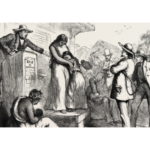Into his 70s, Jim Loewen continued to work, always on too many different things at once, as if he had unlimited time to finish everything. Then, on his 77th birthday, Feb. 6, 2019, he got a medical diagnosis of Stage IV muscle-invasive metastatic bladder cancer. The proportion of people with those adjectives who survive three years was just under 1%. Rather than give them up entirely, Loewen decided to leave descriptions of these projects here, hoping that someone else might finish them. So if you like an idea below, do it! You might touch base with the persons Loewen left in charge of the website, because they might be able to help. As well, they might be able to give you useful publicity once you have finished. Email publichistorysites@gmail.com.
One project is completely finished: an opera libretto, titled “The Liberation of Richmond.”

Loewen wrote a terrific opera libretto on the end of the Civil War. This libretto is available without charge for any person, composer, institution, opera program, etc. that wants to make use of it. Loewen had in mind a “regular” opera, but the music might include slave melodies, jazz, classical …. It is also available without charge, to any group that wishes to modify it into a play. Contact the webmaster for written approval. There may even be some financial support for it as an opera production.
“Notes on the History, Music, and Structure”
The entire libretto, “The Liberation of Richmond”
Alternative ending: Some say an opera must have a death. “The Liberation of Richmond” does have a death, of course, of Abraham Lincoln, but that happens off-stage, not in Richmond. So I wrote an alternative ending, which you can read here.
The Other Side of Gender
This was to be a 200-page book, pointing out that “gender” supposedly means the effect of sexual differences on people. But as the title of a leading book in the field implies, Gender Inequality: Feminist Theories and Politics, gender has come to be synonymous with discrimination against women. Loewen notes that anthropologists see sex roles in “primitive” societies as benefiting men in some areas, women in others. Sociologists generally do not.
Rat Psychology
From his undergraduate days, Loewen had in mind some research that would upend the stodgy Skinner Box and Stimulus-Response world of “Rat Psychology” in the 1960s. As an undergraduate, he got a paper accepted in 1964, but they charged money for reprints, which were mandatory, and he didn’t have the cash, so he finally resubmitted it in 1986 and published it this time! It supported the more accurate and useful theorizing of Edward C. Tolman. Rat psychologists thought it was important not to use words like “think” or “feel,” with regard to rats, relying entirely on measurable external effects, like “stimulus” and “response.” They hypothesized that rats do everything for reward, and reward was almost always food or water. To be sure, a hungry rat wants food and a thirsty rat wants water, but rats are far more complex than that.
Loewen will never write this book, “Rat Psychology,” partly because the field has moved away from S-R theorizing, influenced by ethology and, dare we say it, common sense. Here’s his paper, though, for what it’s worth…
How to Teach College
Loewen planned a book on teaching that would include some of the exercises he developed for Tougaloo and UVM students. It would also include his ideas about how to test students creatively, how to get students to “buy into” course requirements, and other ways to draw good performance from students, even at party schools. Here are his notes for each chapter.
- The Problem
- Teaching and Reaching Diverse Students
- An Effective Course Syllabus
- A Great First Day of Class
- Attendance
- Discussion
- Journals
- How to Lecture
- Getting Students to Write Well
- Teaching Numeracy
- Testing
- Student Evaluations
- The Last Day of Class
- How to use TAs
Surprises on the Land: Unexpected Places that Get History Right
Loewen planned a book (and website) celebrating unexpected places that tell important, difficult, and little-known stories and do it well. Even though he is not likely to finish this book and project, Prof. Stephen Berrey will probably do so.